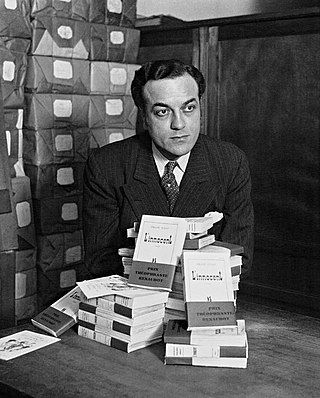
Raymond Gérard Payelle, better known by his pseudonym Philippe Hériat, was a French novelist, playwright and actor. His most famous novels included Les Enfantes gâtés, awarded the Prix Goncourt in 1939, and La Famille Boussardel, which won the Académie Goncourt in 1949.

Marcel L'Herbier was a French filmmaker who achieved prominence as an avant-garde theorist and imaginative practitioner with a series of silent films in the 1920s. His career as a director continued until the 1950s and he made more than 40 feature films in total. During the 1950s and 1960s, he worked on cultural programmes for French television. He also fulfilled many administrative roles in the French film industry, and he was the founder and the first President of the French film school Institut des hautes études cinématographiques (IDHEC).
Le Carnaval des vérités is a 1920 French silent film written and directed by Marcel L'Herbier.

L' Homme du large is a 1920 French silent film directed by Marcel L'Herbier and based on a short story by Honoré de Balzac. It was filmed on the rugged southern coast of Brittany creating atmosphere in a film about the forces of good and evil that motivate human behaviour.

El Dorado is a French silent film directed in 1921 by Marcel L'Herbier. The film was notable for integrating a number of technical innovations into its narrative of a "cinematic melodrama". It achieved considerable success on its release, as a ground-breaking film that was distinctively French at a time when the cinema was felt to be dominated by American productions.

L'Inhumaine is a 1924 French science fiction drama film directed by Marcel L'Herbier. It has the subtitle histoire féerique. L'Inhumaine is notable for its experimental techniques and for the collaboration of many leading practitioners in the decorative arts, architecture and music. The film caused controversy on its release.

Jaque Catelain was a French actor who came to prominence in silent films of the 1920s, and who continued acting in films and on stage until the 1950s. He also wrote and directed two silent films himself, and he was a capable artist and musician. He had a close association with the director Marcel L'Herbier.
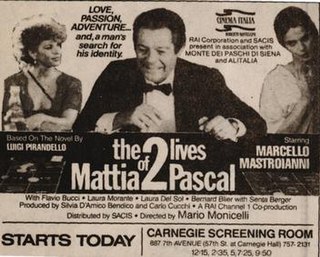
The Two Lives of Mattia Pascal is a 1985 Italian drama film directed by Mario Monicelli. It was adapted from the novel Il fu Mattia Pascal by Luigi Pirandello. It was entered into the 1985 Cannes Film Festival.
Marcelle Pradot was a French actress who worked principally in silent films. She was born at Montmorency, Val-d'Oise, near Paris. At the age of 18 while she was taking classes in dancing and singing in Paris, she was asked by Marcel L'Herbier to appear in his film Le Bercail (1919). She went on to appear in a further eight of L'Herbier's silent films, and then in his first sound film L'Enfant de l'amour (1930) with which she ended her acting career. She was noted as an aristocratic beauty, and she was described by the critic Louis Delluc as "the Infanta of French cinema".

The Last Days of Pompeii (1950) is a black and white French-Italian historical drama, directed by Marcel L'Herbier "in collaboration with" Paolo Moffa, who was also the director of production. It was adapted from Edward Bulwer-Lytton's novel The Last Days of Pompeii. The film has also been known as Sins of Pompeii.
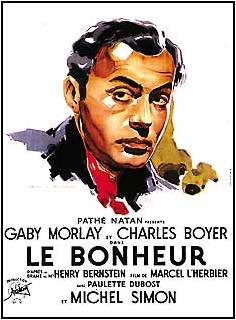
Le Bonheur ("Happiness") is a 1934 French comedy-drama film directed by Marcel L'Herbier. It was adapted from Henri Bernstein's play Le Bonheur, which Bernstein had staged in Paris in March 1933 with Charles Boyer and Michel Simon in leading roles; Boyer and Simon took the same parts in the film.

La Nuit fantastique is a 1942 French fantasy film directed by Marcel L'Herbier. It is regarded as one of the most successful films made in France during the German occupation.
The Late Matthias Pascal may refer to:
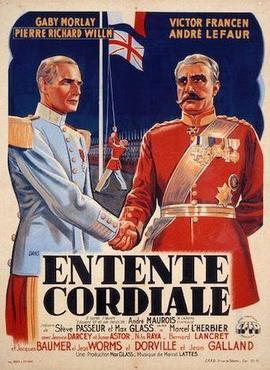
Entente cordiale is a 1939 French drama film directed by Marcel L'Herbier and starring Gaby Morlay, Victor Francen and Pierre Richard-Willm. The film depicts events between the Fashoda crisis in 1898 and the 1904 signing of the Entente Cordiale creating an alliance between Britain and France and ending their historic rivalry. It was based on the book King Edward VII and His Times by André Maurois. It was made with an eye to its propaganda value, following the Munich Agreement of September 1938 and in anticipation of the outbreak of a Second World War which would test the bonds between Britain and France in a conflict with Nazi Germany.

La Comédie du bonheur is a French-Italian film directed by Marcel L'Herbier as a dual-language production. It was filmed in Rome in the early months of 1940, but after Italy joined World War II on the side of Germany, the French and Italian versions of the film were completed separately. The Italian version was released in December 1940 under the title Ecco la felicità!. The French version was released in July 1942.
La Femme d'une nuit is a 1931 French drama film directed by Marcel L'Herbier. It was made simultaneously with Italian and German versions of the same story, which were however not only in different languages but in different genres.

The Man from Nowhere is a 1937 French drama film directed by Pierre Chenal and starring Pierre Blanchar, Isa Miranda and Catherine Fonteney. It was made at the Cines Studios in Rome, and based on Luigi Pirandello's 1904 novel Il fu Mattia Pascal. A separate Italian-language version of the film was also produced.
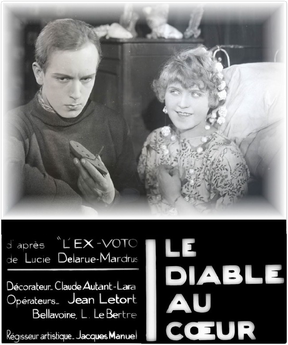
Little Devil-May-Care is a 1928 French-British silent drama film directed by Marcel L'Herbier and starring Betty Balfour, Jaque Catelain and Roger Karl.
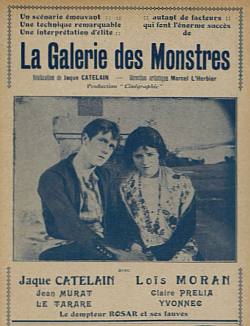
La Galerie des monstres is a 1924 French drama film directed by Jaque Catelain, set against the background of a circus in Spain. It was produced by Cinégraphic, the production company of Marcel L'Herbier.

Veille d'armes is a 1935 French drama film directed by Marcel L'Herbier and starring Annabella and Victor Francen.
















